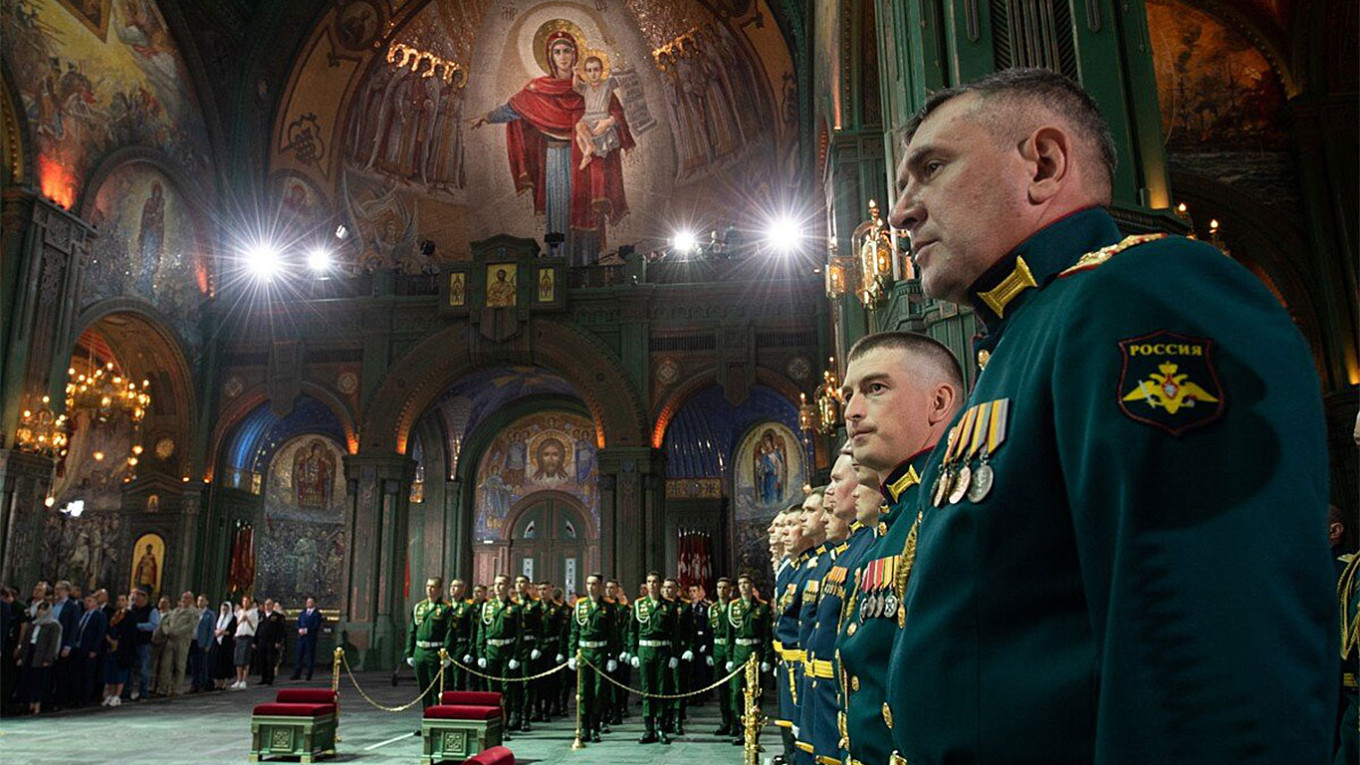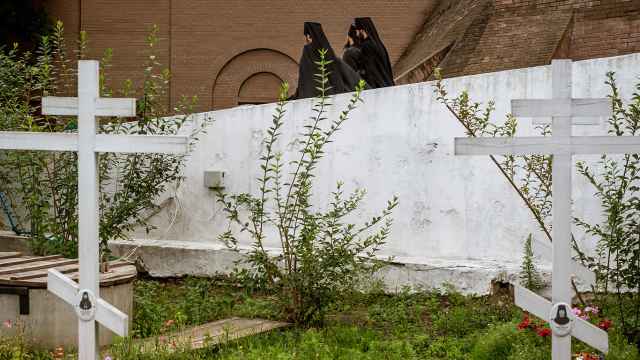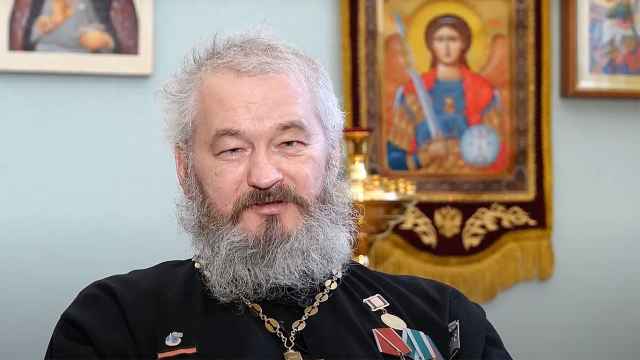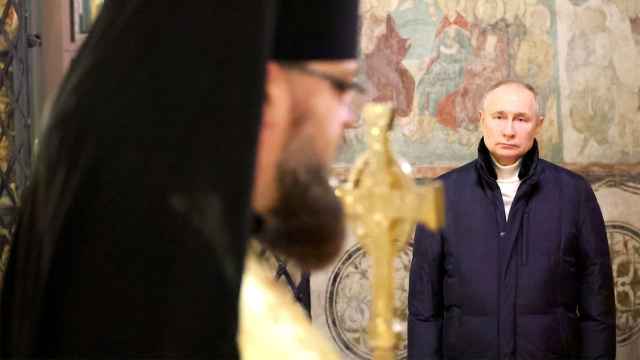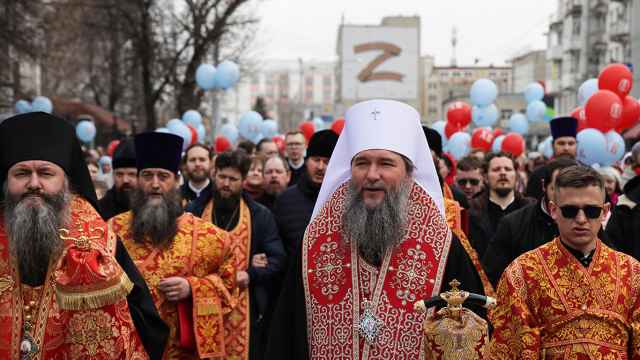The mood among Russia’s special forces and the FSB began to change dramatically in the fall, when Russian troops abandoned Kherson, suffering the latest of many humiliations for the Russian army.
Suddenly, the social media channels we use to communicate with our contacts began to change, as images of religious icons flooded in, along with prayers for the victory of the Russian army and calls to pray for soldiers on the battlefield.
We’ve known most of our contacts in Russia’s special forces and the FSB for years, and none was particularly religious before the war. Now a wave of mysticism has descended on them; the apparent trigger being a growing understanding that the war is not going to end anytime soon.
The higher-ups in the siloviki, the security forces, have long recognized the use of the Russian Orthodox Church as an unofficial arm of the state. In 2002, the Cathedral of St. Sophia of Divine Wisdom was reopened inside the Lubyanka, as the departmental church of the FSB — Patriarch Alexy II himself blessed its opening in a ceremony attended by then FSB chief Nikolai Patrushev.
The army invited the church into its ranks in 2010, introducing the institution of military priests, or chaplains, with salaries paid by the army. The Church presence in the military has grown ever since, culminating in the 2020 construction of the Main Cathedral of the Russian Armed Forces outside Moscow, the biggest Orthodox church in the country. However, until now, this overlap has been top-down, supervised by the Kremlin and the Patriarch.
The military rank and file, and FSB personnel, have remained mostly indifferent, if not overly cynical about religion, tending to mention the Russian Orthodox Church only when talking about Russia being a besieged fortress. The unique, national spirituality provided by the faith is one of the ostensible reasons Russia has been constantly under attack from the West, according to a conspiratorial mindset shared by many in the secret services and the army.
The growing religious mysticism of the kind we have seen since September is completely different, however, and reflects the military's demand for spiritual guidance in a very confusing war.
Guidance offered by men like Andrei Tkachev, a 53-year-old cleric now based in Moscow, where he is a confessor for the youth department of the Moscow city diocese and a popular TV personality. He was born in then-Soviet Ukraine, grew up and studied in Lviv and Kyiv – with a short period in Moscow when he was a student at the Military Institute of the Ministry of Defense’s Faculty of Special Propaganda.
Tkachev disliked army life and returned to Lviv where he was ordained as a priest. Until the annexation of Crimea, he enjoyed a successful career in Ukraine, becoming the host of the religious TV channel "Kievan Rus." He left Ukraine in 2014 for Moscow, and soon became one of the most aggressive anti-Ukrainian voices in the Russian Orthodox Church.
Borrowing from the language of the street, his sermons are simple and accessible. Everything the Russian army does, he defends, regardless of its morality or legality. When in November he was asked on the church-funded TV channel Spas about the Russian bombing of Ukraine’s civilian infrastructure, he said: "it is much better to wipe out some equipment rather than 40,000 alongside it. We are waging war according to Christian principles," he reassured his audience, "because we are destroying transformers, not people who have an immortal soul."
The war has significantly raised Tkachev's profile, with subscribers to his YouTube channel jumping from 870,000 in November 2021 to 1.4 million today. Many of those listening to his words are in the military.
The church has made blood sacrifices for the country. The priest Anatoly Grigoriev, who was killed in September, was embedded with the troops from Tatarstan. In November the Russian pro-war blogosphere exploded with the news that Mikhail Vasilyev, an unofficial chaplain of the Airborne Forces, had been killed. He was well-known in the army — before Ukraine, he had been deployed with troops to Kosovo, Bosnia, Abkhazia, Kyrgyzstan, the North Caucasus, and Syria. On Jan. 22, yet another priest was killed while embedded with the Cossack regiment near Bakhmut in eastern Ukraine.
The last time the post-Soviet Russian military turned to religion was in the 1990s, when the state fought another bloody war, and suffered grievous losses for reasons that were far from clear to many Russians. In 1996, during the first Chechen war, a Russian soldier called Yevgeny Rodionov was taken prisoner and killed by Chechens – according to widely held belief — for refusing to renounce his Christian faith.
A religious cult effectively emerged around Rodionov, and there was demand for him to be made a martyr and saint. Rodionov icons became popular in Russia, and a monument was even built in his honor, but wary of any spontaneous grassroots activities, the Russian Orthodox Church has remained hesitant to officially recognize the Rodionov cult.
Given the far greater potential of the dismal Russian invasion of Ukraine to harm the Russian state, the support offered by the church is on a far larger scale and even includes a willingness to indulge the widespread Russian belief in miracles.
Some of this is frankly bizarre. The pro-Kremlin tabloid Komsomolskaya Pravda has been promoting "Orthodox battalions" in Donbas whose units successfully reported sustaining fewer casualties after each was renamed after Orthodox saints, the paper reported.
Renamed and blessed, something strange happened. Losses began to dramatically decrease and miraculous salvations grew. "There are no more heavy casualties," the story’s headline assured readers.
Since the war in Ukraine began, the Church has made itself an arm of the Kremlin, not only justifying the war but also blessing Russian troops regardless of their conduct in an attempt to raise morale and provide a cause worth dying for — something Putin’s regime has so signally failed to do. The more primitive and mystical that cause is, the better, as long as it bolsters the war effort.
This article was originally published by the Center for European Policy Analysis (CEPA).
A Message from The Moscow Times:
Dear readers,
We are facing unprecedented challenges. Russia's Prosecutor General's Office has designated The Moscow Times as an "undesirable" organization, criminalizing our work and putting our staff at risk of prosecution. This follows our earlier unjust labeling as a "foreign agent."
These actions are direct attempts to silence independent journalism in Russia. The authorities claim our work "discredits the decisions of the Russian leadership." We see things differently: we strive to provide accurate, unbiased reporting on Russia.
We, the journalists of The Moscow Times, refuse to be silenced. But to continue our work, we need your help.
Your support, no matter how small, makes a world of difference. If you can, please support us monthly starting from just $2. It's quick to set up, and every contribution makes a significant impact.
By supporting The Moscow Times, you're defending open, independent journalism in the face of repression. Thank you for standing with us.
Remind me later.




